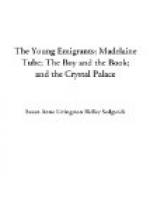Frau Gensfleisch, however, was not dead. Finding that the care of her little fields and vineyard was more than she was able to manage in her declining years, she sold her cottage and land, and returned into the town of Mainz to live, so that she might be near the Father Gottlieb, who was now the only relation she had left besides her absent son. To the good Father she could at least talk about Hans, and he was able sometimes to cheer her fading hopes, by telling her that the day might yet come when Hans would return to spend the rest of his life with her. She lived in a dark and narrow street, and seldom went from home except on certain days, when, as of old, she would take a flask of her ink to the convent for the use of the monks, who were still, as during the childhood of Hans Gensfleisch, busied over their endless copying and writing. It was on the morning of the day on which the traveller we have spoken of above had inquired after her at her old cottage, that a message came to her from Father Gottlieb to say that she must come to the convent with all speed, to hear some tidings of her son, which had been brought by a traveller from the south. With a beating heart she went, and from the Father Gottlieb she heard that a learned scribe had come that day into the town who had known her son in the city of Strasburg. This scribe had brought with him a most wonderful book, and all the town was filled with surprise and curiosity to hear that this volume, which was a copy of the Bible, had been written by one man—the traveller himself—and that in its production he had used neither pen, nor style,[2] nor reed, but had imprinted it with ink in some unknown way, which had caused the writing to be more regular and even, and plainer to read than that of any manuscript which had ever been seen or heard of. The whole town was talking of the book, and the wonder of the people was even greater still when the traveller said that he could at will produce many such books as this, and that each should be so much alike the other, that not one letter—not one jot or one tittle of a letter should be different. Frau Gensfleisch listened in wonder,—but wonder was lost in hope, for she said to herself, “This man has known my Hans, for he too could imprint letters;” and she eagerly inquired his name.
Father Gottlieb said that the name of the stranger was Johann Gutenberg, and that he was tall and dark, and spoke with a northern tongue. He promised Frau Gensfleisch, however, that she should see him and question him herself about her son, as soon as the stranger returned from the palace of the Archbishop, where had gone to exhibit his wonderful book, and he left her in his cell, promising to return and fetch her when the stranger should arrive.
Frau Gensfleisch sat in silence and alone for two heavy hours. She heard bell after bell rung, which summoned the monks to their prayers or to their meals. And many a passing footstep made her cheeks flush and her pulse quicken, as she said to herself, “Now, I shall hear about my son;” and she repeated over to herself all the questions that she would ask and the messages she would send, in case the stranger really knew her Hans; when at last the door of the cell was unlocked and the Father Gottlieb came.




